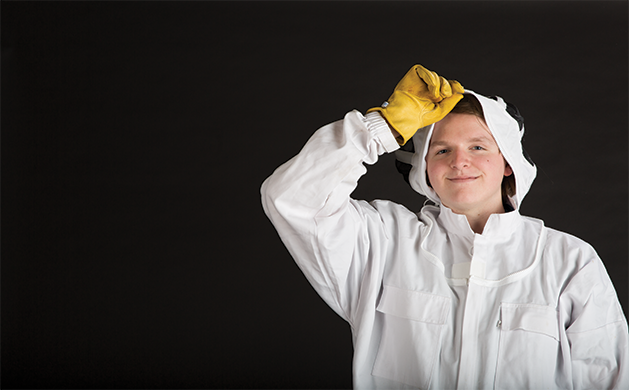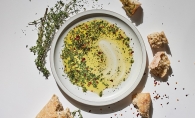
Hear that buzz? Besides hornets, Edina has bees. A passion project evolved into a hive of activity for high school student Kurt Harmening. His research paper based on beekeeping, the decline of bees and collapse of hives grew into something bigger. Today, Kurt has his own hive in his backyard, a testimony to the scope of the action steps involved with his Edina High School (EHS) project.
His affinity for bees really began in Switzerland at a private international school’s beekeeping club. Kurt, three other students and the teacher would tend to a hive bi-weekly. The reward came during the fall harvest with honey slated for bees wax candles and soap.
“I loved beekeeping over there. When I came back I wanted to keep it up,” Kurt says.
The road to beehive ownership has its share of twists and turns. First, you must get approval from the city of Edina. The process took Kurt a couple months to complete, involved regulatory requirements for where the hive could be located and included an inspection. Neighbors can advocate against new hives. Letters went to two houses in every direction. “A lot of people are afraid of bees,” Kurt says. Happily, everyone supported his hive, and his permit was approved.
Bees tend to fly straight up and away from the hive. Typically, they forage within a two-mile radius of their home but will go farther if needed to find food. The likelihood of a passerby being stung near the hive of 20,000 to 30,000 bees is remote. Reaching into the colony is another matter as Kurt can attest. Hive maintenance and honey harvesting get keepers so close to the bees that stings are more probable. The 20 or 30 bee stings he’s endured over the years triggered an allergy to bees. Sting prevention is an ongoing plight not just for Kurt but his dog. The playful King Charles cavalier mix has a habit of eating bees and gets stung during the purge.
Beekeeping can have other pitfalls. Last fall Kurt’s fledgling hive from California succumbed to viral mites and perished. Yet, he plans for a new bee colony this spring.
The tools of the trade don’t come cheap. Expect to pay $500 for live bees, a beekeeping suit, boxes, deep frames and other supplies. Don’t skimp on the suit and thick gloves. Even on the hottest summer days Kurt sweats it out wearing a hat and protective gear. “You think there’s mesh on the face and it would be cool—not at all,” he says.
Kurt also worked for the Bee Squad at the University of Minnesota. He visited hives to help with maintenance and ensure colonies were in good shape. In one unique service call, the Bee Squad was called to control a swarm congregated on a wall outside the Mall of America. Kurt and his colleagues were able to remove them.
Bees have a delicate nature and a tough life complicated by chemicals, habitat destruction and other threats.
“Bees are still on the decline,” Kurt says. Edina residents can help by planting bee-friendly, neonicotinoid-free flowers and avoid use of chemicals on lawns. “The only way to solve the problem is to prevent it in the first place,” Kurt says. The difficulties for bees are vast. Some become so sick they can’t find their way back to the hive. The environment poses additional challenges. “All this climate change is throwing bees off,” Kurt says.
But beekeeping is worth the headaches. Besides the environmental benefits, having a hive means a honey harvest. Local honey is better because the pollen has more health benefits when the bees are pollinating plants close by. Kurt sold his honey under the Kurt’s Bees name for $20 a bottle, and then a discounted $10 a bottle at EHS. Admittedly, he’s not a huge honey eater and lets others do the cooking. “We’ve gone through one bottle and that’s crazy,” he says. His family only puts honey on toast and in tea.
Beekeeping fits in with his career interests. Future education plans include biology study with the goal of become a doctor, and he’d like to keep hives along the way. “I love nature, and these bees are so critically important to our lives,” Kurt says.
After speaking to Kurt about bees, the fate of the world seems more secure. The EHS junior buzzes about beekeeping in Edina along with his passion for nature, biology and insects. It’s a tale embedded in environmentalism, ecology and science. Kurt wants to do what’s good for the Earth hive by hive.









